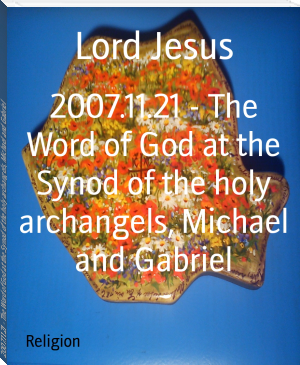The Mistakes of Jesus, William Floyd [best e reader for epub TXT] 📗

- Author: William Floyd
- Performer: -
Book online «The Mistakes of Jesus, William Floyd [best e reader for epub TXT] 📗». Author William Floyd
Jesus did what the devils requested, cruelly killing two thousand inoffensive valuable animals that belonged to other people.
"Jesus went up to Jerusalem, and found in the temple those that sold oxen and sheep and doves, and the changers of money sitting: and when he had made a scourge of small cords, he drove them all out of the temple, and the sheep and the oxen; and poured out the changers' money, and overthrew the tables."
Jesus has been defended for other acts on the ground that he was living in less civilized times than our own, but here he is seen offending both ancient and modern sensibilities. The destruction of the swine and the routing of the merchants were sensational and erratic exhibitions. If reformers today should destroy herds of animals, except to protect public health by due process of law, or overthrow banks, they would be liable to arrest in any city of Christendom. Therefore the consensus of opinion denies exoneration to Jesus for his spasmodic resort to direct action.
Egotism
If Jesus was not God, but merely the ideal man, his estimate of himself was excessive. In addition to his remarks already quoted there are many other instances of an exaggerated ego.
"If any man come to me, and hate not his father, and mother, and wife, and children, and brethren, and sisters, yea, and his own life also, he cannot be my disciple."[14]
"Whosoever liveth and believeth in me shall never die."[15]
"If ye believe not that I am he, ye shall die in your sins."[16]
"I am the light of the world."[17]
"I am the Son of God."[18]
"I am the resurrection and the life."[19]
If Jesus was correct in claiming that he was the Messiah, if he could control the elements and send people to heaven or hell, he was justified in any extreme remarks; but not if he were merely a man. Every person is entitled to have as good an opinion of himself as his character and ability warrant, but expressions of his own worth are unseemly even if true, and are inexcusable if exaggerated. As Jesus himself said (though this authority is only for believers) testimony about oneself is unreliable.
Jesus not only claimed to be more than a man, he threatened his hearers with death if they did not agree with him. All of which might be permissible if he were God, but was an egotistical illusion if he was merely human.
Lack of Courtesy
Jesus did not always exhibit the courtesy one would expect of a gentleman, or even of a nature's nobleman.
The first instance of lack of consideration was when he slipped away from his parents, causing them unnecessary anxiety: "Son, why hast thou thus dealt with us? behold thy father and I have sought thee sorrowing."[20] He had remained behind to study Hebrew theology and did not tell his parents, presumably because he thought they would not have permitted the venture.
Another instance was found in his daily life:
"A certain Pharisee besought him to dine with him: and he went in, and sat down to meat. And when the Pharisee saw it, he marvelled that he had not first washed before dinner. And the Lord said unto him, Now do ye Pharisees make clean the outside of the cup and the platter; but your inward part is full of ravening and wickedness. Ye fools ..."[21]
Jesus had not only failed to wash as was expected of a guest, but defended his uncleanliness and abused his host.
At another time Jesus was discourteous to his mother:
"And when they wanted wine, the mother of Jesus saith unto him, They have no wine. Jesus saith unto her, Woman, what have I to do with thee?"[22]
Jesus was apparently annoyed at his mother's interference, though he followed her suggestion. He did not set a good example for children in addressing their mothers.
When the Syrophenician woman asked him to help her daughter, "Jesus saith unto her, Let the children first be filled: for it is not meet to take the children's bread, and to cast it unto the dogs. And she answered and said unto him, Yes, Lord: yet the dogs under the table eat of the children's crumbs. And he said unto her, For this saying go thy way; the devil is gone out of thy daughter."[23]
Jesus practically admitted that he had made a mistake in speaking unkindly to a Gentile. Her clever answer induced him to change his decision. A physician who called a stranger's child a dog would now be considered brutal even in a free hospital.
"And another of his disciples said unto him, Lord, suffer me first to go and bury my father. But Jesus said unto him, Follow me; and let the dead bury their dead."[24]
Jesus could have allowed the man to attend his father's funeral and follow him later. Would not that have set a better precedent?
When Peter intervened to protect Jesus, the latter "turned, and said unto Peter, Get thee behind me, Satan: thou art an offence unto me."[25]
Even though Jesus was determined to go on with the sacrifice, he could have been more appreciative of his best friend's suggestion.
Unethical Advice
When the unjust steward cheated his employer, Jesus gave the following remarkable advice:
"And the lord commended the unjust steward, because he had done wisely: for the children of this world are in their generation wiser than the children of light. And I say unto you, Make to yourselves friends of the mammon of unrighteousness; that, when ye fail, they may receive you into everlasting habitations."[26]
This passage should be read again before deciding whether Jesus advised opportunism rather than morality. The words must be taken as they are; no interpretation can be based upon the assumption that Jesus was always right and therefore meant something different from what he said.
Sermon on the Mount
Many Christians say that they care nothing for theology; that the Sermon on the Mount contains all that is necessary for a religious life, being a perfect system of ethics.
The Sermon on the Mount does contain many admirable principles, but also some that are inferior to present standards. Few of the people who praise this Sermon would think it proper to abide by all the teachings therein. Christian parents do not wish their children to follow either the letter or the spirit of this famous preachment. It begins in the fifth chapter of Matthew.
"Blessed are the poor in spirit." Is it better to be poor in spirit than rich and eager in spirit? Being poor in spirit is to be faint of heart. This is bad advice, is it not?
"Blessed are they that mourn, for they shall be comforted." This means that those who mourn on earth will be comforted in heaven; but now that life on earth has assumed greater importance, so far as our daily conduct is concerned, than life in heaven, the philosophy of gloom is unfortunate. Jesus preached acceptance of unhappiness as the common lot of man; he should not therefore be credited with providing happiness on earth. His urge to rejoice was usually in anticipation of good things to come in the next world. He preached sorrow for all here rather than the greater happiness for the greater number.
"There shall be famines, and pestilences, and earthquakes in divers places. All these are the beginning of sorrows. Then shall they deliver you up to be afflicted, and shall kill you: and ye shall be hated of all nations for my name's sake ... and because iniquity shall abound, the love of many shall wax cold. But he that shall endure unto the end, the same shall be saved."[27]
"Blessed are ye that weep now: for ye shall laugh."[28]
The beatitude, "Blessed are the meek: for they shall inherit the earth" is of doubtful accuracy or value.
The commands to pluck out an eye or cut off a hand may not have been intended literally, although it does appear as if Jesus referred to the physical body, and men have often so interpreted these doubtful instructions.
Jesus said that "Whosoever shall marry her that is divorced committeth adultery", which is no longer true. Those who permit remarriage after divorce should admit an error on Jesus' part.
"But I say unto you, That ye resist not evil." This instruction should be reversed, should it not? Evil should be resisted in every possible way that does not involve evil in itself. What modern ethical teacher will say that evil should not be resisted, or that this advice of Jesus was perfection? If his instruction was intended to refer to physical resistance, then no righteous person should fight in any war, no police should be delegated to arrest criminals. If the phrase has merely a spiritual meaning, it is certainly unsound advice, for evil should be overcome by good.
A fanatical attitude towards the law was recommended when Jesus said: "If any man will sue thee at the law, and take away thy coat, let him have thy cloak also." Extreme generosity and non-resistance are taught, but the illustration was not well thought out, for if the man had already won his suit and taken the coat, it is evident that the owner of the coat had put up a legal fight instead of giving away his coat and cloak as Jesus implies he should. Yielding more than a legal opponent wins in court is not compatible with defending the suit, nor is it a principle that would meet the approval of most of Jesus' followers today.
"Be ye therefore perfect, even as your Father which is in heaven is perfect." If Jesus referred to Jehovah as his Father in heaven, the standard of perfection advocated was very low, for Jehovah was, as Thomas Jefferson put it, "cruel, vindictive, capricious and unjust."
The Lord's Prayer is not the simple, clear, devotional petition that is usually supposed. Take it literally, as was undoubtedly intended, and its irrelevance to actual life is at once apparent.
"Our Father which art in heaven, Hallowed be thy name. Thy kingdom come. Thy will be done in earth, as it is in heaven." This is a proper invocation only if there is a heaven in which God's will is done. None such has been discovered.
"Give us this day our daily bread" indicates that God would not give our daily sustenance without being asked, whereas there is no apparent distinction in actual living between those who pray for bread and those who do not.
"And forgive us our debts, as we forgive our debtors" intimates that divine forgiveness is not to be superior to that of men.
"And lead us not into temptation"—as if God were anxious to lead us there and would be deterred by our prayer.
It may seem like petty cavil to criticize the prayer that has been acclaimed for many centuries as ideal, but, seriously, what valuable principle for guidance through life does the Lord's Prayer contain? Do its requests represent the best modern conception of prayer as an inward aspiration rather than as petitionary? Is it not vain repetition to recite it again and again?
The general idea of offering prayer in order to obtain various needs presents the difficulty





Comments (0)